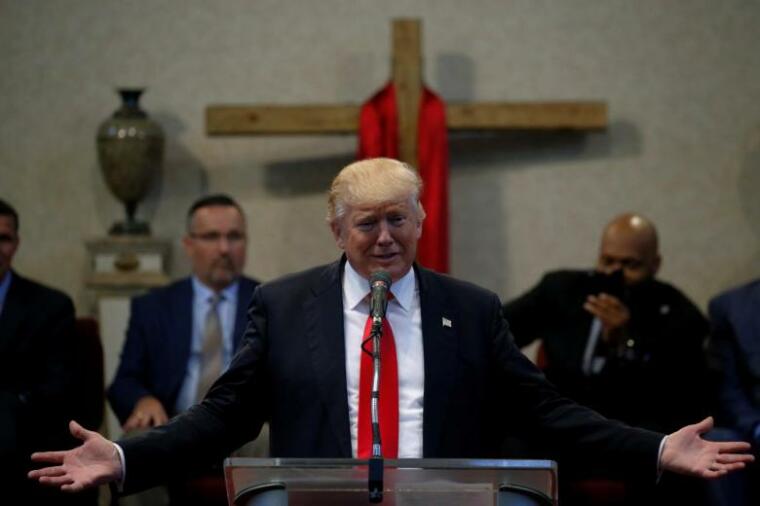Trump's approval ratings shrink among evangelicals, survey reveals

President Donald Trump's approval ratings among evangelical Christians have shrunk by more than half in the past five months, according to a new survey.
In March, a Politico/Daily Caller survey found that evangelicals approved of Trump's performance by a margin of two to one, 63 percent to 32 percent. However, after five months, the same surveyors found that the margin has decreased by more than half, to 56–42.
In his op-ed column for Religion News Service, Mark Silk noted that the survey does not separate out white evangelicals, and he speculated that the declining support for Trump probably came from Latino evangelicals.
The president's approval ratings saw an even bigger slip among non-evangelical Christians, both Protestant and Catholic. In March, the two demographic groups approved of Trump's performance, 58 percent to 40 percent, but they disapprove of it today by a margin of 56 percent to 40 percent.
The new survey comes amid reports that the influence of evangelical leaders on the White House is growing under Trump.
Earlier this month, Richard Land, the former head of the Southern Baptist Convention's Ethics and Religious Liberty Commission, claimed that evangelicals have gained "unprecedented access" to the White House under Trump and are having an "impact on policy."
In an interview with Ronnie Floyd on the Family Research Council's Washington program, Land said that he and other evangelical leaders, including Tony Perkins, Gary Bauer and Ralph Reed "all testified to the fact that we've never had the kind of open access to the administration that we've had in this administration."
"Not only do we have access, but we have had impact on decisions. We have had impact on policy. And it's a whole different atmosphere, there really is, there's a different atmosphere in the White House and the administration," Land added.
Trump's evangelical supporters, along with conservative U.S. Catholics, have recently been criticized by two confidants of Pope Francis for forming an alliance of "hate."
In an article published in the Jesuit journal La Civilta Cattolica, the two confidants warned that the political alliance between some American Catholics and evangelicals had "gradually radicalized" to promote conflict and hatred and a "xenophobic and Islamophobic vision that wants walls and purifying deportations."
The article drew outrage from conservative American Catholics and evangelicals, who claimed that the piece grossly misrepresents their views to make a political point.
In response to the article, Johnnie Moore, a leader of Trump's evangelical advisory board, wrote a letter to the Vatican earlier this week to request a meeting with the pope to address "efforts to divide Catholics and Evangelicals."
 Christians don't have to affirm transgenderism, but they can’t express that view at work: tribunal
Christians don't have to affirm transgenderism, but they can’t express that view at work: tribunal Archaeology discovery: Medieval Christian prayer beads found on Holy Island
Archaeology discovery: Medieval Christian prayer beads found on Holy Island Presbyterian Church in America votes to leave National Association of Evangelicals
Presbyterian Church in America votes to leave National Association of Evangelicals Over 50 killed in 'vile and satanic' attack at Nigerian church on Pentecost Sunday
Over 50 killed in 'vile and satanic' attack at Nigerian church on Pentecost Sunday Ukrainian Orthodox Church severs ties with Moscow over Patriarch Kirill's support for Putin's war
Ukrainian Orthodox Church severs ties with Moscow over Patriarch Kirill's support for Putin's war Islamic State kills 20 Nigerian Christians as revenge for US airstrike
Islamic State kills 20 Nigerian Christians as revenge for US airstrike Man who served 33 years in prison for murder leads inmates to Christ
Man who served 33 years in prison for murder leads inmates to Christ


 Nigerian student beaten to death, body burned over ‘blasphemous’ WhatsApp message
Nigerian student beaten to death, body burned over ‘blasphemous’ WhatsApp message 'A new low': World reacts after Hong Kong arrests 90-year-old Cardinal Joseph Zen
'A new low': World reacts after Hong Kong arrests 90-year-old Cardinal Joseph Zen Iran sentences Christian man to 10 years in prison for hosting house church worship gathering
Iran sentences Christian man to 10 years in prison for hosting house church worship gathering French Guyana: Pastor shot dead, church set on fire after meeting delegation of Evangelicals
French Guyana: Pastor shot dead, church set on fire after meeting delegation of Evangelicals ‘Talking Jesus’ report finds only 6% of UK adults identify as practicing Christians
‘Talking Jesus’ report finds only 6% of UK adults identify as practicing Christians Mission Eurasia ministry center blown up in Ukraine, hundreds of Bibles destroyed: 'God will provide'
Mission Eurasia ministry center blown up in Ukraine, hundreds of Bibles destroyed: 'God will provide' Church holds service for first time after ISIS desecrated it 8 years ago
Church holds service for first time after ISIS desecrated it 8 years ago Burger King apologizes for 'offensive campaign' using Jesus' words at the Last Supper
Burger King apologizes for 'offensive campaign' using Jesus' words at the Last Supper Uganda: Muslims abduct teacher, burn him inside mosque for praying in Christ’s name
Uganda: Muslims abduct teacher, burn him inside mosque for praying in Christ’s name